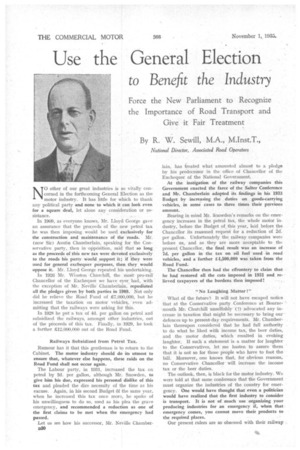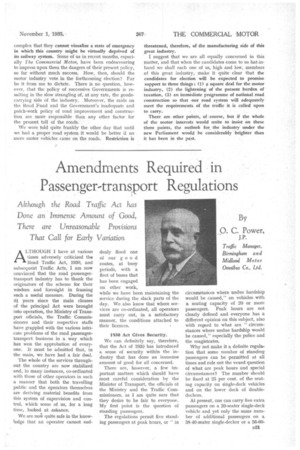Use the General Election
Page 78

Page 79

If you've noticed an error in this article please click here to report it so we can fix it.
to Benefit the Industry
Force the New Parliament to Recognize the Importance of Road Transport and Give it Fair Treatment By R. W. Sewill, M.A., M.Inst.T.,
National Director, Associated Road Operators N. other of our great industries is so vitally concerned in the forthcoming General Election as the motor industry. It has little for which to thank any political party and none to which it can look even for a square deal, let alone any consideration or assistance.
In 1909, as everyone knows, Mr. Lloyd George gave an assurance that the proceeds of the new petrol tax he was then imposing would be used exclusively for the construction and maintenance of the roads. Mr. (now Sir) Austin Chamberlain, speaking for the Conservative party, then in opposition, said that so long as the proceeds of this new tax were devoted exclusively to the roads his party Would, support it; if they were used for general exchequer purposes, then they , would oppose it. Mr. Lloyd George repeated his undertaking.
In 1926 Mr. Winston Churchill, the most pro-rail Chancellor of the Exchequer we have eyer had, with the exception of Mr. Neville Chamberlain, repudiated all the pledges given by both parties in 1909. Not only did he relieve the Road Fund of £7,000,000, but he increased the taxation on motor vehicles, even • admitting that the railways were asking for this.
In 1928 he put a tax of 4d. per gallon on petrol and subsidized the railways, amongst other industries, out of the proceeds of this tax. Finally, in 1929, he took a further £12,000,000 out of the Road Fund.
Railways Subsidized from Petrol Tax.
Rumour has it that this gentleman is to return to the Cabinet. The motor industry should do its utmost to ensure that, whatever else happens, these raids on the Road Fund shall not occur again.
The Labour party, in 1931, increased the tax on petrol by 2d. per gallon, although Mr. Snowden, to give him his due, expressed his personal dislike of this tax and pleaded the dire necessity of the time as his excuse. Again, in his second Budget of the same year, when he increased this tax once more, he spoke of his unwillingness to do so, used as his plea the grave emergency, and recommended a reduction as one of the first claims to be met when the emergency had passed.
Let us see how his successor, 1V1r. Neville ChamberD20
lain, has treated what amounted almost to a pledge by his predecessor in the office of Chancellor of the Exchequer of the National Government.
At the instigation of the railway companies this Government enacted the farce of the Salter Conference and Mr. Chamberlain adopted its findings in his 1933 Budget by increasing the duties on goods-carrying vehicles, in some cases to three times their previous amount.
Bearing in mind Mr. Snowden's remarks on the emergency increases in the petrol tax, the whole motor industry, before the Budget of this year, laid .before the Chancellor its reasoned request for a reduction of per gallon. Unfortunately the railway companies were before us, and as they are more acceptable to the present Chancellor, the final result was an increase of 7d. per gallon in the tax on oil fuel used in road vehicles, and a further £4,500,000 was taken from the Road Fund.
The Chancellor then had the effrontery to claim that he had restored all the cuts imposed in 1931 and relieved taxpayers of the burdens then imposed; "No Laughing Matter !"
What of the future? It will not have escaped notice that at the Conservative party Conference at Bourne'mouth Mr. Churchill unselfishly (?) advocated any increase in taxation that might be necessary to bring our defences up to present-day requirements. Mr. Chamberlain thereupon considered that he had full authority . to do what he liked with income tax, the beer duties, and the motor duties, which resulted in evoking laughter. If such a statement is a matter for laughter to the Conservatives, let me hasten to assure them that it is not so for those people who have to foot the bill. Moreover, one knows that, for obvious reasons, no Conservative Chancellor • will increase the income tax or the beer duties.
The outlook, then, is black for the motor industry. We were told at that same conference that the Government must organize the industries of the country for emergency. One would have thought that even a politician would have realized that the first industry to consider is transport. It is not of much use organizing your producing industries for an emergency if, when that emergency comes, you cannot move their products to the required places.
Our present rulers are so obsessed with their railway... complex that they cannot visualize a state of emergency in which this country might be virtually deprived of its railway system. Some of us in recent months, especially The Commercial Motor, have been endeavouring to impress upon them the dangers of their present policy, so far without much success. How, then, should the motor industry vote in the forthcoming election? Far be it from me to dictate. There is no question, however, that the policy of successive Governments is resulting in the slow strangling of, at any rate, the goodscarrying side of the industry. Moreover, the raids on the Road Fund and the Government's inadequate and patch-work policy of road improvement and construction are more responsible than any other factor for the present toll of the roads.
We were told quite frankly the other day that until we had a proper road system it would be better if no more motor vehicles came on the roads. Restriction is
threatened, therefore, of the manufacturing side of this great industry.
I suggest that we are all equally concerned in this matter, and that when the candidates come to us hat-inhand we shall each one of us, high and low, members of this great industry, make it quite clear that the candidates for election will be expected to promise support to three things: (1) a square deal for the motor industry, (2) the lightening of the present burden of taxation, (3) an immediate programme of national road construction so that our road system will adequately meet the requirements of the traffic it is called upon to carry.
There are other points, of course, but if the whole of the motor interests would unite to insist on these three points, the outlook for, the industry under the new Parliament would be considerably brighter than it has been in the past.
















































































































































































